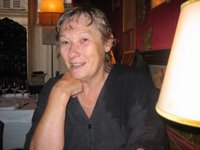Granny on the Road
 A rather magical friend arrived in Nouméa on 11 July 2006. Her name is Anne Bercot. If you don't know Anne, you'll be fascinated by her. If you do know Anne, you'll be excited to learn that she has just begun another rather impressive project ...
A rather magical friend arrived in Nouméa on 11 July 2006. Her name is Anne Bercot. If you don't know Anne, you'll be fascinated by her. If you do know Anne, you'll be excited to learn that she has just begun another rather impressive project ...Anne has begun a new life at the age of 63. She has just started a SEVEN-YEAR TOUR of the WORLD and we are lucky enough to have her start with us. Anne is planning to travel the world on her own, hopping from here to Fiji, Vanautu, Tahiti, New Zealand, Australia and then off to South America, the United States (by cargo boat, plane, foot, thumb, whatever!), and who knows where else. She has already stayed with two tribes here in New Caledonia, has learned more about the native culture than we have, has hitchhiked down the island, slept in a "case" (hut) on the sea, dined with a local TV presenter and has a list of New Caledonian contacts a mile long!
If you want to know more, see Anne's blog (which she is maintaining in English and French). You will learn more about her reasons for her seven-year journey, why she has started here, what she is experiencing, and where she is going next. I highly recommend http://grannyontheroad.blogspot.com.




